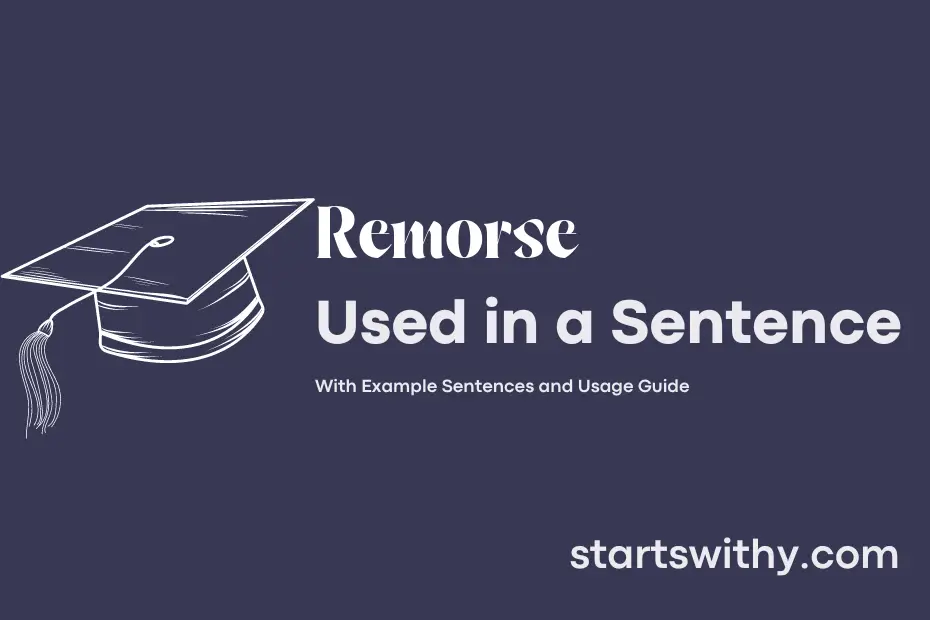Do you know what it means to feel remorse? Remorse is a powerful emotion characterized by deep regret and guilt over a past action or decision. It involves acknowledging wrongdoing and feeling a sense of responsibility for the consequences of one’s actions.
Experiencing remorse can lead to reflection, personal growth, and the desire to make amends for mistakes. It is a complex emotion that can be both painful and transformative, serving as a crucial tool for learning from our past behaviors and striving to be better in the future.
7 Examples Of Remorse Used In a Sentence For Kids
- Remorse is when you feel sorry for something you did wrong.
- It is important to show remorse when you hurt someone’s feelings.
- Saying sorry shows that you have remorse for your actions.
- We should always try to make things right when we have remorse.
- When we have remorse, we learn from our mistakes and try to do better next time.
- It’s okay to feel remorse because it means you care about others.
- Showing remorse helps us grow and become better friends.
14 Sentences with Remorse Examples
- Remorse crept in as the college student realized they had spent all their savings on unnecessary purchases.
- After realizing they had procrastinated until the last moment, the college student felt a wave of remorse wash over them.
- Finding out they had failed an exam due to not studying enough left the college student feeling overwhelmed with remorse.
- The college student couldn’t shake off the feeling of remorse after missing an important deadline for their project.
- Remorse set in when the college student realized they had hurt their friend’s feelings with thoughtless words.
- Skipping classes multiple times led to a sense of remorse as the college student faced the consequences of falling behind.
- Remorse filled the college student’s heart as they watched their friends graduate while they repeated a year due to poor academic performance.
- The college student felt a pang of remorse when they realized they had been neglecting their mental health in pursuit of academic success.
- Remorse washed over the college student when they realized they had copied someone else’s work without giving proper credit.
- The college student felt remorse for not speaking up against unfair treatment of classmates in a group project.
- Remorse set in as the college student reflected on the partying lifestyle that had affected their grades negatively.
- Overbooking themselves with extracurricular activities left the college student with a sense of remorse as they struggled to keep up with their studies.
- Failing to contribute to a group assignment left the college student feeling heavy with remorse for letting their teammates down.
- The pressure to excel in academics led the college student to make unethical choices, leaving them drowning in remorse.
How To Use Remorse in Sentences?
To use the word “Remorse” in a sentence, start by understanding its meaning. Remorse is a feeling of deep regret or guilt for a wrong committed.
When constructing a sentence with Remorse, first identify a situation where someone has done something they regret. For example, “She was filled with remorse after realizing she had hurt her friend’s feelings.”
Remember to place Remorse in the appropriate context within the sentence. You can use it at the beginning, middle, or end of a sentence, depending on the emphasis you want to give to the feeling of regret or guilt. For instance, “Despite his initial anger, he eventually felt deep remorse for his harsh words.”
Using Remorse in a sentence can help convey the complex emotions associated with regret and guilt. It adds depth to a statement and allows the reader or listener to understand the emotional state of the person experiencing Remorse.
In summary, remember to choose a suitable scenario where someone feels deep regret or guilt, and place Remorse in the sentence to accurately express these emotions. With practice, you can effectively incorporate Remorse into your writing or conversations, enhancing your ability to communicate feelings of regret or guilt.
Conclusion
In summary, sentences with remorse are statements that express feelings of regret or guilt for past actions. These sentences often convey a sense of sorrow or repentance for having caused harm or hurt to others, reflecting a recognition of one’s mistakes or wrongdoing. Examples of sentences with remorse include phrases like “I deeply regret my actions” or “I wish I could take back what I said.”
By using sentences with remorse, individuals acknowledge their responsibility for their actions and show a willingness to make amends or seek forgiveness. These expressions can help foster understanding, empathy, and reconciliation in relationships or situations where harm has been done. Embracing remorse in our words and behaviors can be a powerful tool in promoting healing and growth, both personally and within our interactions with others.



